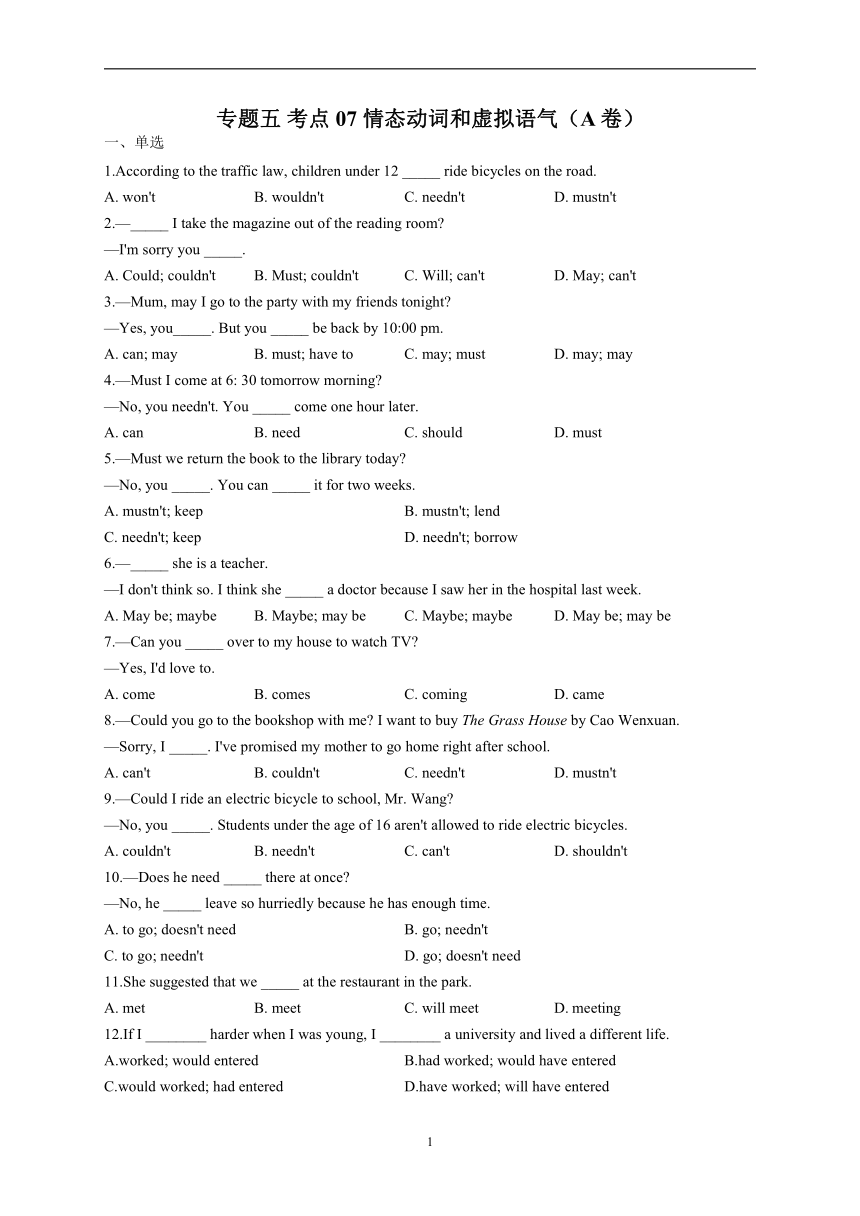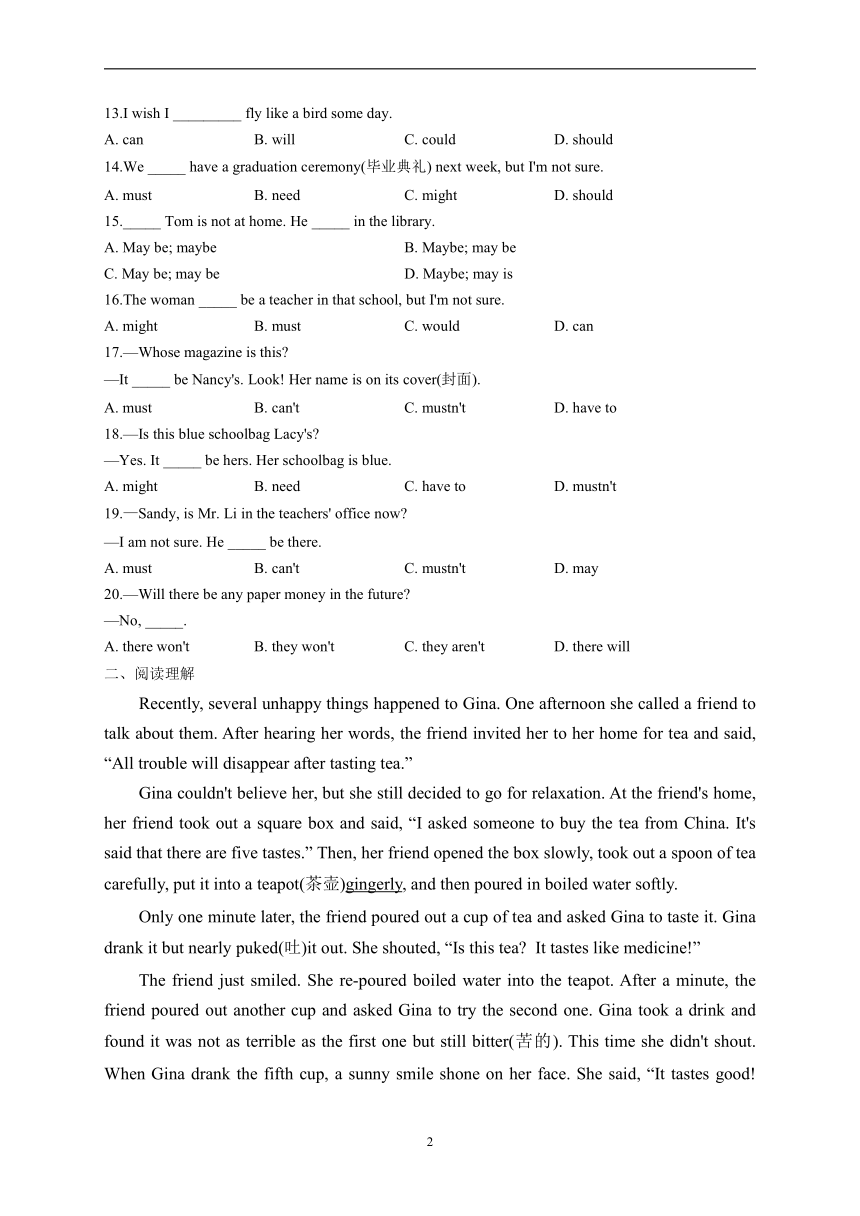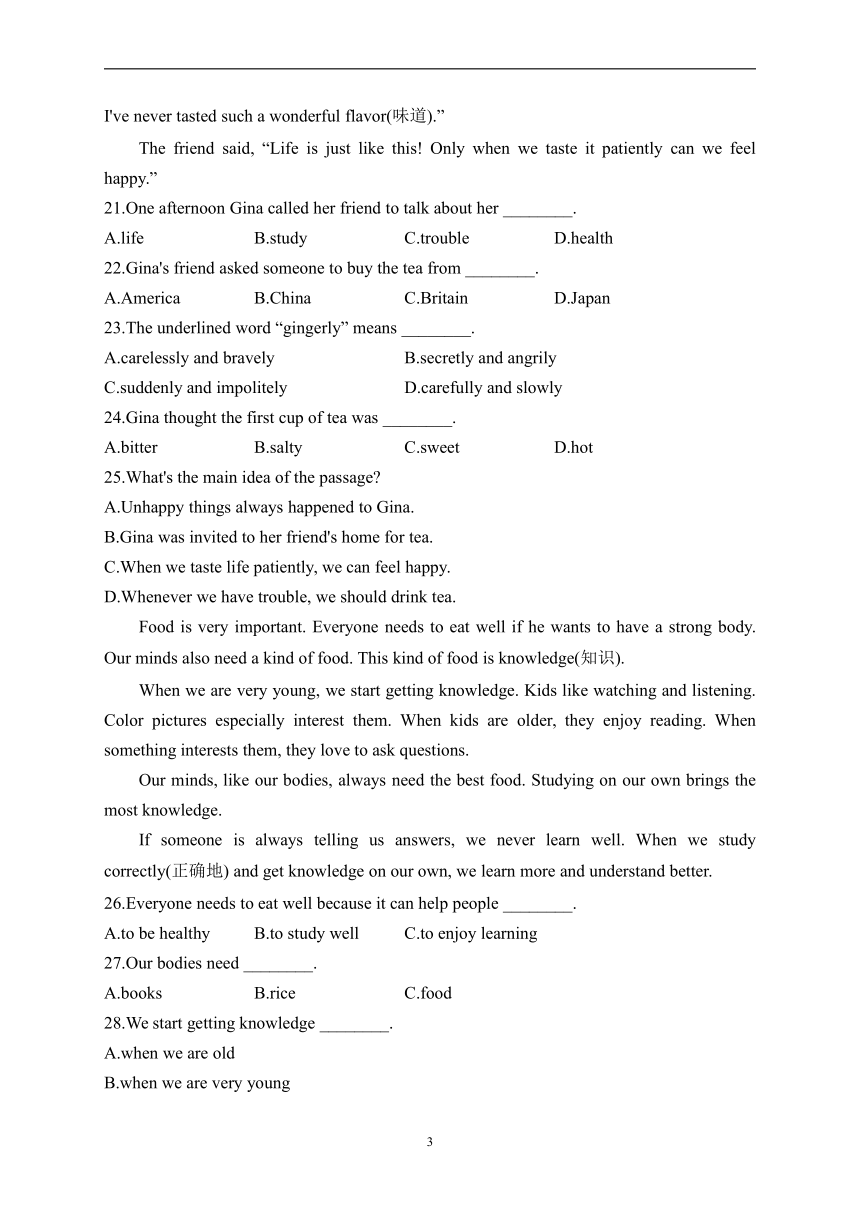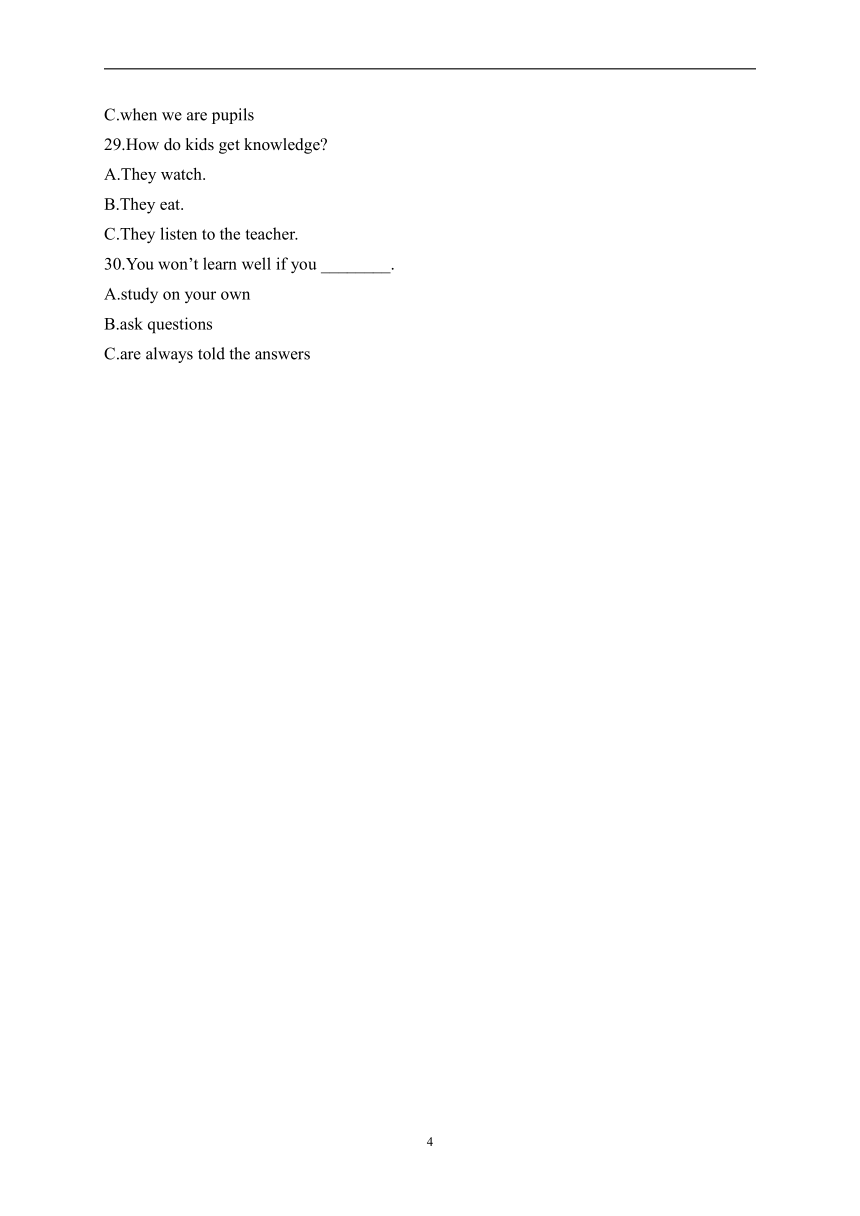2023届中考英语高频考点专项练习:专题五 考点07 情态动词和虚拟语气(A卷)(含解析)
文档属性
| 名称 | 2023届中考英语高频考点专项练习:专题五 考点07 情态动词和虚拟语气(A卷)(含解析) |  | |
| 格式 | docx | ||
| 文件大小 | 32.2KB | ||
| 资源类型 | 教案 | ||
| 版本资源 | 通用版 | ||
| 科目 | 英语 | ||
| 更新时间 | 2022-12-17 10:30:30 | ||
图片预览




文档简介
专题五 考点07 情态动词和虚拟语气(A卷)
一、单选
1.According to the traffic law, children under 12 _____ ride bicycles on the road.
A. won't B. wouldn't C. needn't D. mustn't
2.—_____ I take the magazine out of the reading room
—I'm sorry you _____.
A. Could; couldn't B. Must; couldn't C. Will; can't D. May; can't
3.—Mum, may I go to the party with my friends tonight
—Yes, you_____. But you _____ be back by 10:00 pm.
A. can; may B. must; have to C. may; must D. may; may
4.—Must I come at 6: 30 tomorrow morning
—No, you needn't. You _____ come one hour later.
A. can B. need C. should D. must
5.—Must we return the book to the library today
—No, you _____. You can _____ it for two weeks.
A. mustn't; keep B. mustn't; lend
C. needn't; keep D. needn't; borrow
6.—_____ she is a teacher.
—I don't think so. I think she _____ a doctor because I saw her in the hospital last week.
A. May be; maybe B. Maybe; may be C. Maybe; maybe D. May be; may be
7.—Can you _____ over to my house to watch TV
—Yes, I'd love to.
A. come B. comes C. coming D. came
8.—Could you go to the bookshop with me I want to buy The Grass House by Cao Wenxuan.
—Sorry, I _____. I've promised my mother to go home right after school.
A. can't B. couldn't C. needn't D. mustn't
9.—Could I ride an electric bicycle to school, Mr. Wang
—No, you _____. Students under the age of 16 aren't allowed to ride electric bicycles.
A. couldn't B. needn't C. can't D. shouldn't
10.—Does he need _____ there at once
—No, he _____ leave so hurriedly because he has enough time.
A. to go; doesn't need B. go; needn't
C. to go; needn't D. go; doesn't need
11.She suggested that we _____ at the restaurant in the park.
A. met B. meet C. will meet D. meeting
12.If I ________ harder when I was young, I ________ a university and lived a different life.
A.worked; would entered B.had worked; would have entered
C.would worked; had entered D.have worked; will have entered
13.I wish I _________ fly like a bird some day.
A. can B. will C. could D. should
14.We _____ have a graduation ceremony(毕业典礼) next week, but I'm not sure.
A. must B. need C. might D. should
15._____ Tom is not at home. He _____ in the library.
A. May be; maybe B. Maybe; may be
C. May be; may be D. Maybe; may is
16.The woman _____ be a teacher in that school, but I'm not sure.
A. might B. must C. would D. can
17.—Whose magazine is this
—It _____ be Nancy's. Look! Her name is on its cover(封面).
A. must B. can't C. mustn't D. have to
18.—Is this blue schoolbag Lacy's
—Yes. It _____ be hers. Her schoolbag is blue.
A. might B. need C. have to D. mustn't
19.—Sandy, is Mr. Li in the teachers' office now
—I am not sure. He _____ be there.
A. must B. can't C. mustn't D. may
20.—Will there be any paper money in the future
—No, _____.
A. there won't B. they won't C. they aren't D. there will
二、阅读理解
Recently, several unhappy things happened to Gina. One afternoon she called a friend to talk about them. After hearing her words, the friend invited her to her home for tea and said, “All trouble will disappear after tasting tea.”
Gina couldn't believe her, but she still decided to go for relaxation. At the friend's home, her friend took out a square box and said, “I asked someone to buy the tea from China. It's said that there are five tastes.” Then, her friend opened the box slowly, took out a spoon of tea carefully, put it into a teapot(茶壶)gingerly, and then poured in boiled water softly.
Only one minute later, the friend poured out a cup of tea and asked Gina to taste it. Gina drank it but nearly puked(吐)it out. She shouted, “Is this tea It tastes like medicine!”
The friend just smiled. She re-poured boiled water into the teapot. After a minute, the friend poured out another cup and asked Gina to try the second one. Gina took a drink and found it was not as terrible as the first one but still bitter(苦的). This time she didn't shout. When Gina drank the fifth cup, a sunny smile shone on her face. She said, “It tastes good! I've never tasted such a wonderful flavor(味道).”
The friend said, “Life is just like this! Only when we taste it patiently can we feel happy.”
21.One afternoon Gina called her friend to talk about her ________.
A.life B.study C.trouble D.health
22.Gina's friend asked someone to buy the tea from ________.
A.America B.China C.Britain D.Japan
23.The underlined word “gingerly” means ________.
A.carelessly and bravely B.secretly and angrily
C.suddenly and impolitely D.carefully and slowly
24.Gina thought the first cup of tea was ________.
A.bitter B.salty C.sweet D.hot
25.What's the main idea of the passage
A.Unhappy things always happened to Gina.
B.Gina was invited to her friend's home for tea.
C.When we taste life patiently, we can feel happy.
D.Whenever we have trouble, we should drink tea.
Food is very important. Everyone needs to eat well if he wants to have a strong body. Our minds also need a kind of food. This kind of food is knowledge(知识).
When we are very young, we start getting knowledge. Kids like watching and listening. Color pictures especially interest them. When kids are older, they enjoy reading. When something interests them, they love to ask questions.
Our minds, like our bodies, always need the best food. Studying on our own brings the most knowledge.
If someone is always telling us answers, we never learn well. When we study correctly(正确地) and get knowledge on our own, we learn more and understand better.
26.Everyone needs to eat well because it can help people ________.
A.to be healthy B.to study well C.to enjoy learning
27.Our bodies need ________.
A.books B.rice C.food
28.We start getting knowledge ________.
A.when we are old
B.when we are very young
C.when we are pupils
29.How do kids get knowledge
A.They watch.
B.They eat.
C.They listen to the teacher.
30.You won’t learn well if you ________.
A.study on your own
B.ask questions
C.are always told the answers
答案以及解析
1.答案:D
解析:句意为:根据交通法规,12岁以下的儿童禁止在路上骑自行车。根据According to the traffic law可知,此处表示“禁止”。故选D项。
2.答案:D
解析:句意为:——我可以将杂志拿出阅览室吗 ——很遗憾,你不能。第一个空表示请求别人允许,应用May; 由第二个空前的sorry可知此空表示“不可以”,应用can't。故选D项。
3.答案:C
解析:句意为:——妈妈,今晚我可以与朋友一起去参加聚会吗 ——可以。但你必须在晚上10点前回来。以may开头的一般疑问句的肯定回答用“Yes, you may.”; 由答语中的But可知第二个空表示“必须”。故选C项。
4.答案:A
解析:can意为“能; 可以”; need意为“需要”; should意为“应该”; must意为“必须”。根据语境可知应选A项。
5.答案:C
解析:根据答语中的No可知第一空为否定回答,回答以must开头的一般疑问句时,肯定回答还用must,而否定回答一般用needn't或don't have to,故排除A项和B项; 再根据for two weeks可知,第二空应该用延续性动词,应选keep。故选C项。
6.答案:B
解析:maybe作副词,意为“也许;可能”,在句中作状语,常位于句首;may be中may是情态动词,be是动词原形,两者构成完整的谓语,意为“也许是;可能是”。故选B项。
7.答案:A
解析:问句中Can为情态动词,故后面的实义动词用原形。
8.答案:A
解析:由“I've promised my mother to go home right after school.”可知此处为否定回答;对以Could开头的问句进行否定回答时用can't。
9.答案:C
解析:couldn't意为“不能”; needn't意为“没必要”; can't意为“不能”; shouldn't意为“不应该”。结合No可知这里是否定回答,问句是委婉的请求,回答应用can't,故选C项。
10.答案:C
解析:问句中的need是行为动词,其后应用动词不定式作宾语; 表示“不必”可用needn't或don't/didn't/doesn't need to,后接动词原形,答语中设空后接的是动词原形leave,结合选项可知第二空用needn't。故选C项。
11.答案:B
解析:suggest意为“建议”,that引导的宾语从句作其宾语时,从句谓语为“should+动词原形”结构,且should通常可以省略。故选B项。
12.答案:B
解析:句意:如果我年轻时多努力一点,我就能上大学,过一种不同的生活。考查虚拟语气。分析句子可知,本句是虚拟语气;根据"when I was young",可知是与过去事实相反的假设,if从句需用had done结构,主句用would have done结构。故选B。
13.答案:C
解析:当wish后的宾语从句表达不能够实现或与事实相反的愿望时,该宾语从句要用虚拟语气表示;根据wish可知主句为一般现在时,故空处应用一般过去时,且此处表达“能力”。故选C项。
14.答案:C
解析:句意为: 下周我们可能有个毕业典礼, 但我不确定。must意为"必须"; need意为"需要"; might意为"可能"; should意为"应该"。根据but I'm not sure可知, 此处指的是"可能", 故选C项。
15.答案:B
解析:句意为: 也许汤姆不在家。他可能在图书馆。maybe是副词, 一般位于句首; may be是"情态动词+be", 表示一种推测。结合语境, 故选B项。
16.答案:A
解析:句意为: 这个女人可能是那所学校的老师, 但是我不确定。might意为"可能"; must意为"一定; 必须"; would意为"将"; can意为"能; 可以"。根据but I'm not sure可知might符合语境。
17.答案:A
解析:根据“Look! Her name is on its cover.”可知,这里表示肯定推测,故选A项。
18.答案:A
解析:might表推测,意为“可能”; need意为“需要”; have to意为“不得不”; mustn't意为“禁止”。根据语境可知,莱西的书包是蓝色的,因此这个蓝色的书包可能是莱西的。故选A项。
19.答案:D
解析:must为"必须"; can't意为"不能"; mustn't意为"禁止"; may意为"可能"。根据语境, 故选D项。
20.答案:A
解析:以情态动词Will开头的there be句型的一般疑问句,其肯定回答用“Yes, there will.”,否定回答用“No, there won't.”。结合语境,故选A项。
21.答案:C
解析:细节理解题。根据短文第一段“Recently, several unhappy things happened to Gina. One afternoon she called a friend to talk about them.”可知,Gina和朋友谈的是自己遇到的不开心的事情,也就是trouble“麻烦,烦恼”。故选C。
22.答案:B
解析:细节理解题。根据短文第二段her friend took out a square box and said, “I asked someone to buy the tea from China.”可知,Gina的朋友是让人从中国买的茶叶。故选B。
23.答案:D
解析:词义猜测题。根据划线单词所在的语境“Then, her friend opened the box slowly, took out a spoon of tea carefully, put it into a teapot(茶壶)gingerly, and then poured in boiled water softly.”可以看到,Gina的朋友打开盒子、拿出茶匙、往茶壶里放茶叶、倒进开水里,这一系列的动作都使用了slowly, carefully, softly修饰,是“慢慢地、小心地、温柔地”,因此gingerly与这几个副词的意思应该是相近的,所以A中的bravely、B中的angrily和C中的impolitely都不符合语境。故选D。
24.答案:A
解析:细节理解题。根据短文第三段 “Gina drank it but nearly puked(吐)it out. She shouted, ‘Is this tea It tastes like medicine!’”可知,Gina喝了第一杯茶,感觉像喝药一样;再根据第四段 “Gina took a drink and found it was not as terrible as the first one but still bitter”,Gina喝的第二杯不像第一杯那样苦了。因此Gina觉得第一杯茶太苦了。故选A。
25.答案:C
解析:主旨大意题。这篇短文先是讲述了Gina去朋友家里喝茶的故事,通过叙事告诉我们一个道理。因此最后一段是点明文章主旨的句子,根据最后一段 “The friend said, ‘Life is just like this! Only when we taste it patiently can we feel happy.’”可知,作者想要告诉我们的是:只有当我们耐心品味生活的时候,我们才会感到幸福。故选C。
26.答案:A
解析:细节理解题。根据第一段"Everyone needs to eat well if he wants to have a strong body."可知, 如果一个人想拥有强壮的身体就要好好吃饭, 这样才会变健康。故选A。
27.答案:C
解析:细节理解题。根据第三段"Our minds, like our bodies, always need the best food."可知, 我们的大脑就像我们的身体一样总是需要最好的食物。故选C。
28.答案:B
解析:细节理解题。根据第二段"When we are very young, we start getting knowledge."可知, 我们还很小的时候就开始接受知识。故选B。
29.答案:A
解析:细节理解题。根据第二段"When we are very young, we start getting knowledge. Kids like watching and listening. Color pictures especially interest them. When kids are older, they enjoy reading."可知, 在我们很小的时候就开始接受知识, 小孩子喜欢通过看和听接受知识而大一点了之后他们就变得更喜欢通过阅读来获取知识。故选A。
30.答案:C
解析:细节理解题。根据最后一段"If someone is always telling us answers, we never learn well."可知, 如果总有人在旁边告诉我们正确答案的话我们永远都学不好。故选C。
2
一、单选
1.According to the traffic law, children under 12 _____ ride bicycles on the road.
A. won't B. wouldn't C. needn't D. mustn't
2.—_____ I take the magazine out of the reading room
—I'm sorry you _____.
A. Could; couldn't B. Must; couldn't C. Will; can't D. May; can't
3.—Mum, may I go to the party with my friends tonight
—Yes, you_____. But you _____ be back by 10:00 pm.
A. can; may B. must; have to C. may; must D. may; may
4.—Must I come at 6: 30 tomorrow morning
—No, you needn't. You _____ come one hour later.
A. can B. need C. should D. must
5.—Must we return the book to the library today
—No, you _____. You can _____ it for two weeks.
A. mustn't; keep B. mustn't; lend
C. needn't; keep D. needn't; borrow
6.—_____ she is a teacher.
—I don't think so. I think she _____ a doctor because I saw her in the hospital last week.
A. May be; maybe B. Maybe; may be C. Maybe; maybe D. May be; may be
7.—Can you _____ over to my house to watch TV
—Yes, I'd love to.
A. come B. comes C. coming D. came
8.—Could you go to the bookshop with me I want to buy The Grass House by Cao Wenxuan.
—Sorry, I _____. I've promised my mother to go home right after school.
A. can't B. couldn't C. needn't D. mustn't
9.—Could I ride an electric bicycle to school, Mr. Wang
—No, you _____. Students under the age of 16 aren't allowed to ride electric bicycles.
A. couldn't B. needn't C. can't D. shouldn't
10.—Does he need _____ there at once
—No, he _____ leave so hurriedly because he has enough time.
A. to go; doesn't need B. go; needn't
C. to go; needn't D. go; doesn't need
11.She suggested that we _____ at the restaurant in the park.
A. met B. meet C. will meet D. meeting
12.If I ________ harder when I was young, I ________ a university and lived a different life.
A.worked; would entered B.had worked; would have entered
C.would worked; had entered D.have worked; will have entered
13.I wish I _________ fly like a bird some day.
A. can B. will C. could D. should
14.We _____ have a graduation ceremony(毕业典礼) next week, but I'm not sure.
A. must B. need C. might D. should
15._____ Tom is not at home. He _____ in the library.
A. May be; maybe B. Maybe; may be
C. May be; may be D. Maybe; may is
16.The woman _____ be a teacher in that school, but I'm not sure.
A. might B. must C. would D. can
17.—Whose magazine is this
—It _____ be Nancy's. Look! Her name is on its cover(封面).
A. must B. can't C. mustn't D. have to
18.—Is this blue schoolbag Lacy's
—Yes. It _____ be hers. Her schoolbag is blue.
A. might B. need C. have to D. mustn't
19.—Sandy, is Mr. Li in the teachers' office now
—I am not sure. He _____ be there.
A. must B. can't C. mustn't D. may
20.—Will there be any paper money in the future
—No, _____.
A. there won't B. they won't C. they aren't D. there will
二、阅读理解
Recently, several unhappy things happened to Gina. One afternoon she called a friend to talk about them. After hearing her words, the friend invited her to her home for tea and said, “All trouble will disappear after tasting tea.”
Gina couldn't believe her, but she still decided to go for relaxation. At the friend's home, her friend took out a square box and said, “I asked someone to buy the tea from China. It's said that there are five tastes.” Then, her friend opened the box slowly, took out a spoon of tea carefully, put it into a teapot(茶壶)gingerly, and then poured in boiled water softly.
Only one minute later, the friend poured out a cup of tea and asked Gina to taste it. Gina drank it but nearly puked(吐)it out. She shouted, “Is this tea It tastes like medicine!”
The friend just smiled. She re-poured boiled water into the teapot. After a minute, the friend poured out another cup and asked Gina to try the second one. Gina took a drink and found it was not as terrible as the first one but still bitter(苦的). This time she didn't shout. When Gina drank the fifth cup, a sunny smile shone on her face. She said, “It tastes good! I've never tasted such a wonderful flavor(味道).”
The friend said, “Life is just like this! Only when we taste it patiently can we feel happy.”
21.One afternoon Gina called her friend to talk about her ________.
A.life B.study C.trouble D.health
22.Gina's friend asked someone to buy the tea from ________.
A.America B.China C.Britain D.Japan
23.The underlined word “gingerly” means ________.
A.carelessly and bravely B.secretly and angrily
C.suddenly and impolitely D.carefully and slowly
24.Gina thought the first cup of tea was ________.
A.bitter B.salty C.sweet D.hot
25.What's the main idea of the passage
A.Unhappy things always happened to Gina.
B.Gina was invited to her friend's home for tea.
C.When we taste life patiently, we can feel happy.
D.Whenever we have trouble, we should drink tea.
Food is very important. Everyone needs to eat well if he wants to have a strong body. Our minds also need a kind of food. This kind of food is knowledge(知识).
When we are very young, we start getting knowledge. Kids like watching and listening. Color pictures especially interest them. When kids are older, they enjoy reading. When something interests them, they love to ask questions.
Our minds, like our bodies, always need the best food. Studying on our own brings the most knowledge.
If someone is always telling us answers, we never learn well. When we study correctly(正确地) and get knowledge on our own, we learn more and understand better.
26.Everyone needs to eat well because it can help people ________.
A.to be healthy B.to study well C.to enjoy learning
27.Our bodies need ________.
A.books B.rice C.food
28.We start getting knowledge ________.
A.when we are old
B.when we are very young
C.when we are pupils
29.How do kids get knowledge
A.They watch.
B.They eat.
C.They listen to the teacher.
30.You won’t learn well if you ________.
A.study on your own
B.ask questions
C.are always told the answers
答案以及解析
1.答案:D
解析:句意为:根据交通法规,12岁以下的儿童禁止在路上骑自行车。根据According to the traffic law可知,此处表示“禁止”。故选D项。
2.答案:D
解析:句意为:——我可以将杂志拿出阅览室吗 ——很遗憾,你不能。第一个空表示请求别人允许,应用May; 由第二个空前的sorry可知此空表示“不可以”,应用can't。故选D项。
3.答案:C
解析:句意为:——妈妈,今晚我可以与朋友一起去参加聚会吗 ——可以。但你必须在晚上10点前回来。以may开头的一般疑问句的肯定回答用“Yes, you may.”; 由答语中的But可知第二个空表示“必须”。故选C项。
4.答案:A
解析:can意为“能; 可以”; need意为“需要”; should意为“应该”; must意为“必须”。根据语境可知应选A项。
5.答案:C
解析:根据答语中的No可知第一空为否定回答,回答以must开头的一般疑问句时,肯定回答还用must,而否定回答一般用needn't或don't have to,故排除A项和B项; 再根据for two weeks可知,第二空应该用延续性动词,应选keep。故选C项。
6.答案:B
解析:maybe作副词,意为“也许;可能”,在句中作状语,常位于句首;may be中may是情态动词,be是动词原形,两者构成完整的谓语,意为“也许是;可能是”。故选B项。
7.答案:A
解析:问句中Can为情态动词,故后面的实义动词用原形。
8.答案:A
解析:由“I've promised my mother to go home right after school.”可知此处为否定回答;对以Could开头的问句进行否定回答时用can't。
9.答案:C
解析:couldn't意为“不能”; needn't意为“没必要”; can't意为“不能”; shouldn't意为“不应该”。结合No可知这里是否定回答,问句是委婉的请求,回答应用can't,故选C项。
10.答案:C
解析:问句中的need是行为动词,其后应用动词不定式作宾语; 表示“不必”可用needn't或don't/didn't/doesn't need to,后接动词原形,答语中设空后接的是动词原形leave,结合选项可知第二空用needn't。故选C项。
11.答案:B
解析:suggest意为“建议”,that引导的宾语从句作其宾语时,从句谓语为“should+动词原形”结构,且should通常可以省略。故选B项。
12.答案:B
解析:句意:如果我年轻时多努力一点,我就能上大学,过一种不同的生活。考查虚拟语气。分析句子可知,本句是虚拟语气;根据"when I was young",可知是与过去事实相反的假设,if从句需用had done结构,主句用would have done结构。故选B。
13.答案:C
解析:当wish后的宾语从句表达不能够实现或与事实相反的愿望时,该宾语从句要用虚拟语气表示;根据wish可知主句为一般现在时,故空处应用一般过去时,且此处表达“能力”。故选C项。
14.答案:C
解析:句意为: 下周我们可能有个毕业典礼, 但我不确定。must意为"必须"; need意为"需要"; might意为"可能"; should意为"应该"。根据but I'm not sure可知, 此处指的是"可能", 故选C项。
15.答案:B
解析:句意为: 也许汤姆不在家。他可能在图书馆。maybe是副词, 一般位于句首; may be是"情态动词+be", 表示一种推测。结合语境, 故选B项。
16.答案:A
解析:句意为: 这个女人可能是那所学校的老师, 但是我不确定。might意为"可能"; must意为"一定; 必须"; would意为"将"; can意为"能; 可以"。根据but I'm not sure可知might符合语境。
17.答案:A
解析:根据“Look! Her name is on its cover.”可知,这里表示肯定推测,故选A项。
18.答案:A
解析:might表推测,意为“可能”; need意为“需要”; have to意为“不得不”; mustn't意为“禁止”。根据语境可知,莱西的书包是蓝色的,因此这个蓝色的书包可能是莱西的。故选A项。
19.答案:D
解析:must为"必须"; can't意为"不能"; mustn't意为"禁止"; may意为"可能"。根据语境, 故选D项。
20.答案:A
解析:以情态动词Will开头的there be句型的一般疑问句,其肯定回答用“Yes, there will.”,否定回答用“No, there won't.”。结合语境,故选A项。
21.答案:C
解析:细节理解题。根据短文第一段“Recently, several unhappy things happened to Gina. One afternoon she called a friend to talk about them.”可知,Gina和朋友谈的是自己遇到的不开心的事情,也就是trouble“麻烦,烦恼”。故选C。
22.答案:B
解析:细节理解题。根据短文第二段her friend took out a square box and said, “I asked someone to buy the tea from China.”可知,Gina的朋友是让人从中国买的茶叶。故选B。
23.答案:D
解析:词义猜测题。根据划线单词所在的语境“Then, her friend opened the box slowly, took out a spoon of tea carefully, put it into a teapot(茶壶)gingerly, and then poured in boiled water softly.”可以看到,Gina的朋友打开盒子、拿出茶匙、往茶壶里放茶叶、倒进开水里,这一系列的动作都使用了slowly, carefully, softly修饰,是“慢慢地、小心地、温柔地”,因此gingerly与这几个副词的意思应该是相近的,所以A中的bravely、B中的angrily和C中的impolitely都不符合语境。故选D。
24.答案:A
解析:细节理解题。根据短文第三段 “Gina drank it but nearly puked(吐)it out. She shouted, ‘Is this tea It tastes like medicine!’”可知,Gina喝了第一杯茶,感觉像喝药一样;再根据第四段 “Gina took a drink and found it was not as terrible as the first one but still bitter”,Gina喝的第二杯不像第一杯那样苦了。因此Gina觉得第一杯茶太苦了。故选A。
25.答案:C
解析:主旨大意题。这篇短文先是讲述了Gina去朋友家里喝茶的故事,通过叙事告诉我们一个道理。因此最后一段是点明文章主旨的句子,根据最后一段 “The friend said, ‘Life is just like this! Only when we taste it patiently can we feel happy.’”可知,作者想要告诉我们的是:只有当我们耐心品味生活的时候,我们才会感到幸福。故选C。
26.答案:A
解析:细节理解题。根据第一段"Everyone needs to eat well if he wants to have a strong body."可知, 如果一个人想拥有强壮的身体就要好好吃饭, 这样才会变健康。故选A。
27.答案:C
解析:细节理解题。根据第三段"Our minds, like our bodies, always need the best food."可知, 我们的大脑就像我们的身体一样总是需要最好的食物。故选C。
28.答案:B
解析:细节理解题。根据第二段"When we are very young, we start getting knowledge."可知, 我们还很小的时候就开始接受知识。故选B。
29.答案:A
解析:细节理解题。根据第二段"When we are very young, we start getting knowledge. Kids like watching and listening. Color pictures especially interest them. When kids are older, they enjoy reading."可知, 在我们很小的时候就开始接受知识, 小孩子喜欢通过看和听接受知识而大一点了之后他们就变得更喜欢通过阅读来获取知识。故选A。
30.答案:C
解析:细节理解题。根据最后一段"If someone is always telling us answers, we never learn well."可知, 如果总有人在旁边告诉我们正确答案的话我们永远都学不好。故选C。
2
同课章节目录
- 词法
- 名词
- 动词和动词短语
- 动词语态
- 动词时态
- 助动词和情态动词
- 非谓语动词
- 冠词
- 代词
- 数词和量词
- 形容词副词及其比较等级
- 介词和介词短语
- 连词和感叹词
- 构词法
- 相似、相近词比较
- 句法
- 陈述句
- 一般疑问句和否定疑问句
- 特殊疑问句及选择疑问句
- 反意疑问句
- 存在句(There be句型)
- 宾语从句
- 定语从句
- 状语从句
- 主谓一致问题
- 简单句
- 并列句
- 复合句
- 主谓一致
- 主、表语从句
- 名词性从句
- 直接引语和间接引语
- 虚拟语气
- 感叹句
- 强调句
- 倒装句
- 祈使句
- 句子的成分
- 句子的分类
- 题型专区
- 单项选择部分
- 易错题
- 完形填空
- 阅读理解
- 词汇练习
- 听说训练
- 句型转换
- 补全对话
- 短文改错
- 翻译
- 书面表达
- 任务型阅读
- 语法填空
- 其他资料
